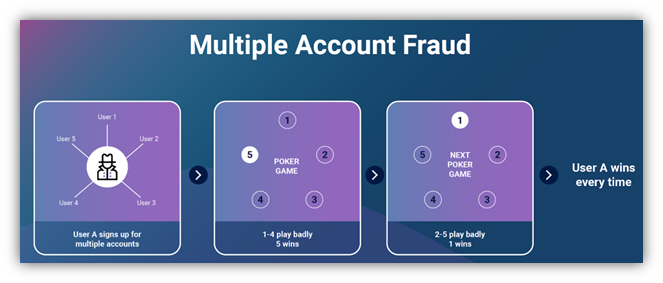


What to do when they win! ID authentication should be a fundamental step anytime a “qualifying event” occurs in a live or online casino, including when a patron wins more than $1,200 in cash or prizes.
After a player hits it big and wants to cash out their gambling gains, all United States casinos (whether online, live, sweepstakes-based, etc) require a valid (non-expired) government issued identity document to authenticate the winner, submitted in conjunction with completed W-2G IRS forms before funds can be withdrawn to a player’s account.Uncle Sam very much wants his cut and will impose severe punitive actions on casinos that run afoul of the litany of transaction rules and regulations in Title 31 of the Currency and Foreign Transactions Reporting Act.
Title 31 Noncompliance Consequences
If a casino or card club willfully does not file a required report or comply with recordkeeping requirements, it is subject to:
If a casino or card club negligently or unintentionally does not file a required report or comply with recordkeeping requirements, it is subject to:
If a casino or card club fails to establish a compliant AML program, it is subject to:
ID Authentication is just good business for Casinos
Beyond avoiding the “stick” of Federal penalties and fines, Casinos should focus on the “carrot” of business case benefits when they remove the problems that arise when patrons gamble and / or attempt to collect winnings with no ID verification:
Identity & Funds Theft
Fraudsters could illicitly obtain another gamer’s credit or debit card details or access account funds via a fake / stolen identity, and then use these payment methods to enter games. Stolen funds could be deposited at account onboarding, with the winnings withdrawn or transferred to the fraudster’s account. Casinos and their legitimate customers would only realize this occurred long after the person committing the crime stopped using the account.
In other ID theft cases, criminals have also submitted fraudulent documents while playing under another person’s identity in an attempt to avoid the repercussions from losses.
Under-Age Gamblers
Casinos are bound by law, moral responsibility, and continued reputation to ensure their gamers are of legal age. The minimum age for gambling does vary state by state, but universally underage gamblers cannot and will not be paid out if they hit a jackpot. In fact, denial of a jackpot to a minor has been repeatedly challenged and upheld in the courts and state gaming boards.
Problem / Compulsive Gamblers
While there are no formal laws that compel casinos to identify and provide support to problem or compulsive gamblers, it just makes good business sense to remove this risk from their environment. It is understood that gambling addiction is linked to, and generates pressure to commit fraud and other offences such as larceny and embezzlement, and should thus be considered a high risk factor to the casino.
When a casino is able to identify players with this profile, it can also monitor their playing habits. This monitoring may inform or control the amount of time a player can play and then cut off access when problems with habitual gambling start to emerge. Compulsive gamblers will try anything to continue feeding their excessive habits, including aforementioned ID theft and other types of fraud activities detailed below.
Multiple Accounts Fraud: Game Collusion
A gamer’s personal profile must contain only their real identity and financial data and casinos actively work to ensure that players do not create duplicate / multiple game accounts. This is done (among many other reasons) to prevent gaming collusion that aims to guarantee that one account “wins”, while the other (fake account) gamers intentionally lose.
Multiple Accounts Collusion Fraud is a particular plague on online gambling sites, where cyber attackers create multiple accounts to initiate their gambling attacks. Operating alone or as part of a wider crime ring, fraudsters can create hundreds of gaming accounts using fake credentials, all in an effort to tilt the balance in their favor as the fake accounts deliberately “lose” so only one designated player can collect all the wins.

Multiple Accounts Fraud: Bonus Exploitation
A more straightforward form of Multiple Accounts Fraud is when a person creates numerous fake accounts to collect on the varied types of bonuses casinos might offer. In this high stakes industry, casinos battle for differentiation via sign-up bonuses, referral bonuses, bonuses to frequent players, or to attract a player back to the casino.
It’s easy to see, then, why a fraudster might be compelled to create multiple accounts to collect these bonuses – bonuses that cost the gambling house a tremendous amount of money, potentially leading to losses that ultimately result in bankruptcy.
In order to prevent this exploit, casinos now limit the bonus amount per account and of course prevent the creation of multiple accounts by verifying one player’s identity and link it to just one account.
Chip dumping
“Chip dumping” is another form of money laundering whereby fraudsters and criminals effectively “convert” illegally gained monies (drug revenue, theft, etc) into legitimate currency via layers of transactional separation. (These funds can’t just be taken straight from the criminal enterprise and deposited into a bank without raising suspicion.) The “transaction” in this case is gambling, taking that illegal cash, and converting it into chips.
The criminal will hire people to convert the cash to chips, gamble for a while, and then cash out, transferring the chips back to the original owner. The conversion back to cash is, as previously mentioned, a taxable event and can be shown as legally earned and thus enter the legitimate financial system. Authenticating the person who cashes out the funds would provide a documented lead or link in the chain to the ultimate criminal / fraudster.
Necessary “Transaction Friction”
To deal with these issues, Casinos and broader government entities require identity and account verification. Before a gamer makes a withdrawal, they are required to verify they are who they said they were when registering. The negative side of this process is that patrons are pulled out of their gaming reverie and shoved back into the accountable real-world when completing the necessary verification process and paperwork.
But all that said, the obvious primary benefit is to ensure the right people receive their rightful funds. Casinos are better protected from fraud and risks to their business survival, and players are assured that casinos are addressing issues such as under-age gambling, irresponsible gambling and similar offences.
U.S. acceptable ID types include:
It is important to note that other ID types such as drivers authorization cards, tribal-issued IDs, and other non-government ID types will likely be rejected. The ID documents must also be current and show the gamer’s address. In lieu of the latter, a (6 month old) bank statement, utility bill, or government issued letter (such as the IRS) is an acceptable document to confirm the gamer’s address. The casino may also confirm bank account ownership by requesting a bank statement from the past six months.


.png)
